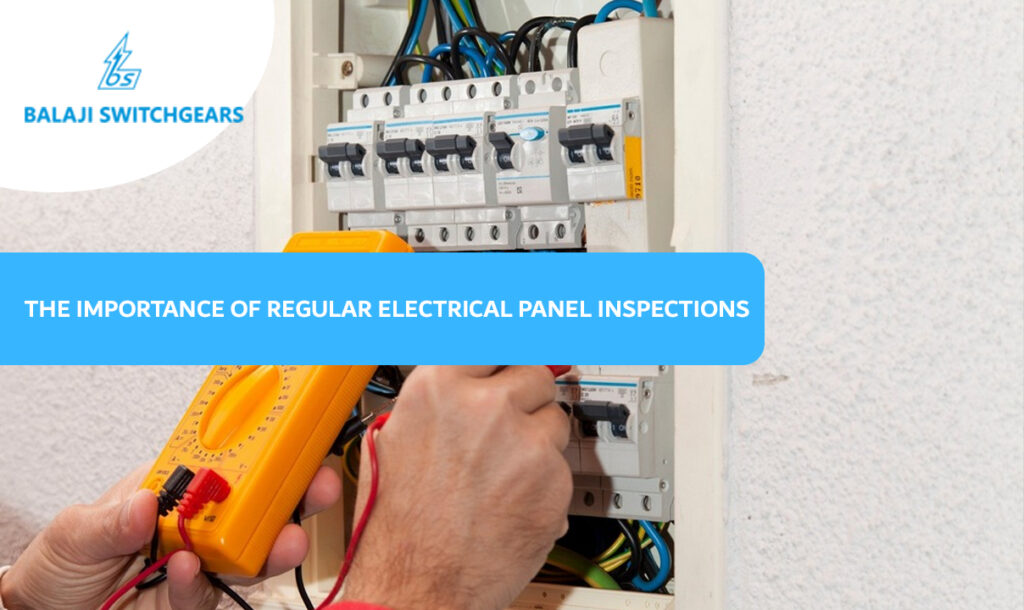Electrical panels are the heart of any building’s electrical system. They manage the flow of electricity, ensuring that power is distributed safely and efficiently to all parts of your home or business. However, like any other system, electrical panels need regular inspections to maintain their functionality and safety. Whether you’re dealing with a low voltage switchgear or advanced industry automation products, Balaji switchgears understand the importance of regular electrical panel inspections is crucial.
Why Regular Inspections Matter
Electrical control panels play a pivotal role in managing the electricity that powers your building. Over time, these panels can wear out, leading to a variety of issues such as faulty wiring, overloaded circuits, and potential fire hazards. Regular inspections can help identify these problems early, preventing costly repairs or dangerous situations down the line.
- Preventing Electrical Fires Electrical fires are one of the most significant risks associated with faulty electrical panels. A small issue like a loose connection or a frayed wire can spark a fire, causing devastating damage. Regular inspections help in detecting these issues before they escalate into something more serious. By ensuring that all components are in good condition, you can significantly reduce the risk of electrical fires.
- Ensuring Compliance with Safety Standards Electrical systems are subject to various safety regulations and standards. Regular inspections ensure that your electrical control panel complies with these standards, helping you avoid fines and penalties. For businesses, this is especially important as non-compliance can result in severe consequences, including the suspension of operations.
- Extending the Lifespan of Your Equipment Electrical panels, especially those dealing with low voltage switchgear and industry automation products, are significant investments. Regular maintenance and inspections can help extend the lifespan of these systems. By addressing minor issues early, you can prevent them from developing into larger problems that could necessitate costly replacements.
- Minimizing Downtime For businesses, especially those in industries reliant on automation, downtime can be incredibly costly. An unexpected electrical failure can halt production, leading to significant financial losses. Regular inspections help in identifying potential issues before they cause a system shutdown, ensuring that your operations run smoothly.
- Improving Energy Efficiency An often-overlooked benefit of regular electrical panel inspections is improved energy efficiency. Faulty wiring, overloaded circuits, and other issues can cause your system to use more energy than necessary. By ensuring that your electrical control panel is functioning optimally, you can reduce energy consumption and lower your utility bills.

What Does an Electrical Panel Inspection Involve?
An electrical panel inspection is a comprehensive review of your electrical system. It typically involves:
- Visual Inspection: The inspector will check for obvious signs of wear and tear, such as frayed wires, burn marks, or rust. They will also ensure that all components are properly labeled and organized.
- Testing: The inspector will test various components to ensure they are functioning correctly. This might involve checking the voltage and current levels, testing circuit breakers, and ensuring that all connections are secure.
- Review of Electrical Load: The inspector will evaluate the electrical load on your system to ensure it is not overloaded. Overloaded systems can lead to overheating and other serious issues.
- Documentation: A thorough inspection will include detailed documentation of the findings. This documentation can be useful for tracking maintenance and for meeting regulatory requirements.
When Should You Schedule an Inspection?
The frequency of electrical panel inspections depends on several factors, including the age of your system, the type of equipment you have, and the environment in which it operates. However, a general rule of thumb is to schedule an inspection at least once a year. For businesses dealing with industry automation products or low voltage switchgear, more frequent inspections may be necessary due to the complexity and critical nature of these systems.
Choosing the Right Professional for the Job
When it comes to electrical panel inspections, it’s essential to work with a qualified professional. Look for someone with experience in dealing with low voltage switchgear and industry automation products, as these systems require specialized knowledge. A professional will not only conduct a thorough inspection but also provide you with valuable insights into how to maintain your system for optimal performance.
Conclusion
Regular electrical panel inspections are not just a good idea—they’re essential for the safety, efficiency, and longevity of your electrical system. Whether you’re managing a residential building or a large industrial facility, investing in regular inspections can save you money, prevent accidents, and keep your operations running smoothly. By staying proactive and scheduling regular inspections, you can ensure that your electrical control panel, including any low voltage switchgear and industry automation products, remains in top condition.


This was a great read! I appreciate the effort you put into explaining this topic. It’s always refreshing to come across well-written content like this. Keep up the good work, and I can’t wait to see more of your posts!